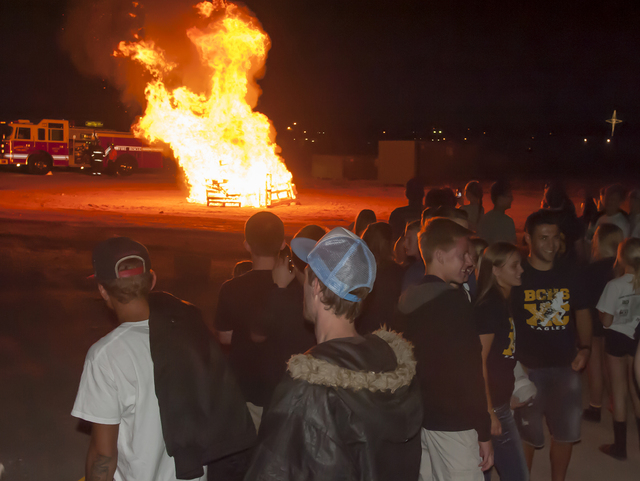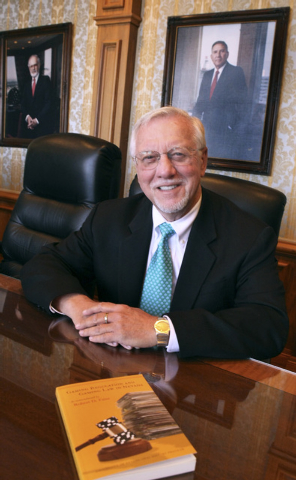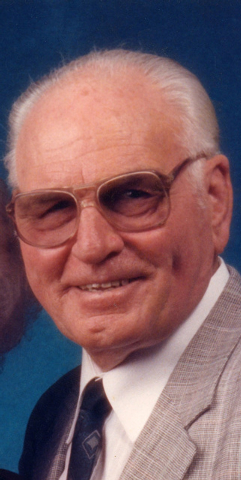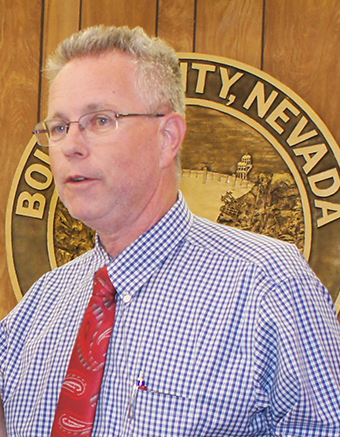2014 is a year to remember
As with any year, there is good news and bad, extreme highs and lows.
The past year brought about the end of an era when the last known Hoover Dam worker died. But it also brought promise for a shining new year as the Clark County School District voted to award $16.3 million to fund new classrooms and administrative facilities at the aging Boulder City High School.
Join us as we take a look at the top stories for 2014, some of which will help shape 2015.
Solar fees help put general fund in black for first time since 2010
The barren Eldorado Valley is still pretty barren, but the gleaming solar panels strewn throughout its energy zone have brought in some serious money for Boulder City.
“Right now, 20 to 25 percent of the general-fund budget is paid for by solar revenue. It’s been the second-highest revenue source in the general fund,” Finance Director Shirley Hughes said.
According to the audit for fiscal year 2014, the city had eight permit fees last year from various solar projects, and gained $1.8 million in permit fees from the Copper Mountain Solar 3 project alone. With the additional revenue, the city’s general fund was in the black for the first time since taking on the debt of Boulder Creek Golf Course.
Once it was determined that Boulder Creek could not survive on its own in 2011, the $6.5 million balance it came with was rolled into the city’s general fund.
But the solar fees throughout the years helped alleviate the debt, and the city’s general fund will be without debt for fiscal year 2015.
City officials face Ethics Commission
City Councilman Cam Walker and City Attorney Dave Olsen both faced the Nevada Ethics Commission in 2014 after former Police Chief Thomas Finn filed complaints against them.
In June 2012, Walker voted on a contractual amendment for the billion-dollar Korea Midland Power Co. solar facility to be built on leased city property. At the time, Walker was McCarthy Building Cos.’ business development director. McCarthy was a proposed contractor for Midland.
The following year, Finn sought an opinion with the Ethics Commission, alleging that Walker violated five sections of the state’s ethics in government law. One allegation was that Walker used his council position to grant unwarranted privileges for himself or a business entity in which he had a financial interest.
Walker voted on the item after Olsen advised him that it would not be improper as long as he disclosed his relationship with McCarthy.
In April, the commission decided that Walker did not vote on the item to willingly gain a financial interest.
Olsen, however, was hit with a $1,500 fine Sept. 10 by the Ethics Commission for his involvement in his son’s civil suit against Boulder City and Henderson in 2010.
It was his first offense, and the $1,500 fine is standard under the circumstances, he said.
The violation stems from Brian Olsen’s arrest in 2010 on allegations that he unlawfully transmitted nude pictures to himself from a female classmate’s cellphone after she let him borrow the phone, according to federal court documents.
After prosecutors declined to prosecute the case because of a lack of conclusive proof, Brian Olsen sued Boulder City and Henderson in U.S. District Court. He alleged police violated his constitutional rights to be free of unlawful arrest, false imprisonment and infliction of emotional distress.
Dave Olsen said his son asked him to take a look at the law after the incident, and was later approached by his son’s attorney, Cal Potter, who asked if he would be able to provide a legal analysis of the case.
Looking back at what arose from his involvement, Dave Olsen said he “should’ve just said no” when approached about the case.
“His judgment was clouded. It was his first offense,” said Caren Cafferata-Jenkins, executive director of the Ethics Commission. “And all factors indicated this was not going to happen again.”
City SLAPP suit fallout
The four-year strategic lawsuit against public participation between Boulder City and the six residents it sued will continue into 2015 after the city filed an appeal with the Nevada Supreme Court.
The residents who were wrongfully sued by Boulder City for circulating ballot initiatives in 2010, according to the Nevada Supreme Court, are coming after the city for another $600,000 in compensatory damages.
The city, represented by the law firm Lionel Sawyer &Collins, successfully argued in District Court in Clark County that it had the right to sue the petitioners to challenge the initiatives.
But the Supreme Court later overturned the rulings and, in September, District Judge Steven Kosach ordered the city to pay the residents $190,000 in attorney fees. The city sought to have the judgment reduced to $30,000, but that request was denied.
City Attorney Dave Olsen said the city had already paid about $200,000 for its own attorney fees, and he acknowledged that the final outcome will not be cheap.
“The most expensive part of this lawsuit is about to begin,” he said.
Former Boulder City Councilwoman Linda Strickland echoed the sentiment. She and her husband, Tracy Strickland, have represented the six residents since the beginning.
She said they are requesting $100,000 in compensatory damages for each plaintiff, the maximum under Nevada’s statute.
“By the time they (Boulder City) pay their lawyers, attorney fees they owe us already, and attorney fees they’re going to owe us, it’s going to be over a million dollars,” Linda Strickland said.
Olsen said the city’s lone intention was was to see if the petitioners’ initiatives were legal by filing a declaratory relief. He said the original District Court rulings that went in the city’s favor helped reassure him that the city did nothing wrong.
But Strickland said the city has learned nothing from the lawsuits.
“They’re just going to make it as difficult and expensive and stressful as possible,” she said.
The compensatory damage trial is scheduled for March 16.
Last known Hoover Dam worker dies
It truly was the end of an era after Darwin Colby, the last known Hoover Dam worker died in the early hours of Nov. 12.
Colby rode his motorcycle from Salina, Utah, to Boulder City as a 15-year-old in 1931 eager to find work during a time when jobs were few and far between as the U.S. struggled with its worst economic crisis in history.
During his time at the dam, Colby worked on the bypass valves and did concrete work on the spillways. After those jobs were completed, Colby was laid off with several other workers. But after speaking with Chief Engineer Frank Crowe, Colby was able to stay on until the project was completed in 1935.
In October, Colby’s daughter, Cathy Leonard came to the annual 31ers dinner to celebrate the legacy her father helped cultivate. She said she and Colby grew closer as the years went by, and he loved telling her stories of what life was like working on the dam. Although he told them often, Leonard said she never tired of hearing her father take her down memory lane.
“He would tell them over and over. It was just wonderful,” she said. “He learned a lot on that dam.”
Boulder City/Hoover Dam Museum employee Shirl Naegle said Colby’s death not only signified the end of the 31ers, but the end of a generation where Americans worked tirelessly to prevail during a time when finding the best of any situation was nearly impossible.
“There was this recognition that this was not just another dam being built in the West. The workers understood that. There was a feeling of accomplishment,” Naegle said.
Although workers were supposed to be at least 18 years old to work on the dam, Naegle said record keeping in the 1930s made it impossible to verify, and there were always a few who slipped through the cracks.
Colby was 98.
District funds improvements for Boulder City High School
In 1948, Israel became a nation, New York Yankees legend Joe DiMaggio was the most popular player in Major League Baseball, and President Harry Truman famously held up a newspaper mocking the headline “Dewey Defeats Truman” after the Chicago Daily Tribune prematurely printed a story of him losing to Gov. Thomas Dewey, R-N.Y., in the presidential election.
It was also the year Boulder City High School was built and, since then, not many changes have been made. But that is sure to change in the next year after the Clark County School District board voted in October to provide the school with $16.3 million to fund new classrooms and administrative facilities.
The school was originally promised a four-phase replacement in 1998, but the district has only provided one phase, a new gymnasium and library in 2004. Since then, no other phase has been addressed.
“Sometimes you have to honor those commitments that were made,” Superintendent Pat Skorkowsky said during the school board meeting in October.
The school has been experiencing several problems, most notably the air-conditioning units that failed during the beginning of the school year. Several teachers were forced to teach outside because they felt the conditions inside were too much to handle.
“I love the school, but we can’t do this,” 11th-grade English teacher Charlene Reid said about the faulty units.
The project is expected to break ground in June and will take about a year to complete. Once the 2015-16 school year begins, portables will be set up for those teachers displaced by the construction.
“It’s change, and no one likes change because they don’t know what it’s going to bring,” Principal Amy Wagner said. “We’re just going to embrace it, and we’re excited for the new possibilities.”
Noted gaming attorney Bob Faiss dies
Among the saddest news of the year was the death of longtime Boulder City resident and world-renowned gaming expert Bob Faiss.
Faiss lost his multiyear battle with cancer June 4
A partner in the law firm Lionel Sawyer &Collins, Faiss was better known around town as the former host of the BCTV show “Hi Bob.” It was something he took pride in.
His career in law happened after working as an aide to Nevada Gov. Grant Sawyer. Sawyer persuaded Faiss, who spent 1968 working as a White House staff assistant to President Lyndon B. Johnson, to attend law school and eventually practice law in Nevada.
“Bob shaped much of the regulatory structure that is still in place today,” former Sen. and Gov. Richard Bryan said. “He was so well-regarded, and he was an effective advocate but he wasn’t the type of lawyer who would bring attention to himself.”
Faiss was remembered by many throughout the state for his nurturing and humble nature. He served as a mentor to many young lawyers at Lionel Sawyer &Collins, the only firm he ever worked for, and also taught at the Boyd School of Law at UNLV.
Shortly before his death, Faiss and his wife, Linda, were honored by the Boulder City Hospital Foundation at its Heart of the Arts gala for their contributions to the community, especially the hospital.
In his final interview, with the Boulder City Review, Faiss praised the hospital for its level of care.
“It’s one of the finest hospitals I’ve been in over the past two-year period. We’re very proud of it. Not only are we supporters and have been for a long time, but we are also patients,” he said in April.
Lake Mead National Recreation Area turns 50
It wasn’t all bad news for Lake Mead this year despite its water level plummeting to a record low.
The Lake Mead National Recreation Area, the first recreation area to be adopted by the National Park Service, turned 50 on Oct. 8. But three months before the milestone, the lake dipped to 1,080 feet, its lowest point since it first began to fill upon completion of Hoover Dam.
The lake’s current level is 1,083 feet, according to the Bureau of Reclamation.
Since its incorporation into the Park Service, it has been a guide for future recreation areas across the country, and its diverse culture brings in millions of people every year, even though it’s lost nearly 40 feet of water since the beginning of 2013.
“Lake Mead was a model for future recreation areas,” Park Service spokeswoman Christie Vanover said. “It’s such a precious resource in the middle of nowhere. But that’s what makes us unique. You can do things here that you can’t do at other unit of NPS.”
But the Lake Mead National Recreation Area owes its existence to Hoover Dam. Without the monumental engineering project that tamed the mighty Colorado River, the Park Service would have looked elsewhere for its first recreation area.
More and more people spent their extra income on recreation during the booming economic years following World War II, and Lake Mead directly benefited from it.
Visitors flocked to the Southwest to set their eyes on Hoover Dam and the man-made reservoir that grew behind it, Vanover said.
The park maintains an average of 6.5 million tourists per year, 3 million more annually from when the Park Service was granted full control of the recreation area, Vanover said.
The park has six concession-operated marinas, three lodges and a boat cruise. Vanover said visitors spend about $260 million in local communities around Lake Mead, contributing to nearly 3,000 local jobs.
Medical marijuana ban
In late February, Boulder City became the first municipality in Clark County to prohibit medical marijuana establishments. The unanimous vote bans testing laboratories, cultivation facilities, facilities for the production of edible marijuana products or marijuana-infused products, and marijuana dispensaries.
Walker said he understood the need for medical marijuana and even had a family member who used it. However, he said the city doesn’t have the resources to deal with the potential demand from entities interested in opening dispensaries.
And Councilman Duncan McCoy said he also had concerns because all marijuana use is illegal under federal law.
Clark County and its incorporated cities can have as many as 40 dispensaries under the law passed by the Nevada Legislature in 2013. Washoe County, the second most populous in the state, is allowed as many as 10, and Carson City can have as many as two. Every other county in Nevada is entitled to one dispensary but local elected officials have the right to opt out of the program.
According to the Health and Human Services Department, many of the state’s rural counties have banned medical marijuana establishments, including Douglas, Elko, Lincoln and Lyon counties.
Judge Miller gains full-time status
After 30 years presiding over municipal and judicial matters as Boulder City’s judge, Victor Miller was awarded a full-time salary by the City Council in November.
Miller, who came to Boulder City as a toddler in 1954, began hearing cases in 1984 when his chambers were located in City Hall. Miller said a factor in boosting his workload was the increase of people coming into Boulder City when the Regional Transportation Commission began running bus routes through town eight years ago.
His swelling workload also was triggered, in part, by the 2013 Nevada Supreme Court case of Sparks v. Sparks Municipal Court where the Supreme Court declared that the Municipal Court was a separate city entity and, therefore, all of the administrative duties and employee issues fell to the judge. Duties once handled by the city are Miller’s responsibility.
With Miller’s full-time status comes a full-time salary. He told the council that former Municipal Judge Ron Dodd of Mesquite, the jurisdiction with a similar population to Boulder City, made significantly more than he did despite Miller having a 10 to 15 percent larger yearly caseload.
Records show that Dodd’s base pay in 2011 was $84,232. That same year, Miller’s base pay was $57,720.
As part of the agreement with the city, Miller will close his law office in Las Vegas and give his full attention to Boulder City. His new annual base salary is just shy of $90,000.
“I’m very pleased and satisfied,” Miller said. “I think we have a unique quality of life in Boulder City, and now I’m in a position to help maintain that.”
Final Homecoming Bonfire
More than 300 Boulder City High School students, alumni, teachers and supporters attended what was most likely the final bonfire as part of the annual Homecoming Week festivities. The tradition dates to at least the 1950s.
The Oct. 9 event was held without official sponsorship from any school or city organization. In fact, no one would claim responsibility for the bonfire, which didn’t really exist, if you asked around.
Although no problems have been reported at the annual event, there has been trouble at other similar incidents in the county, causing insurance rates to soar for these types of events.
Traditionally held at the end of the homecoming parade, the bonfire was an opportunity for the Eagles to “roast” their opponents.
Although nothing specific has been announced, students vowed to find an alternative to the bonfire.
“This doesn’t end here,” sophomore princess Kenadee Bailey said at the time.
“As underclassmen, we have a responsibility to work with everyone to make sure that there is some sort of event that will carry on the tradition in place of the bonfire.”
Contact reporter Steven Slivka at sslivka@bouldercityreview.com or at 702-586-9401. Follow him on Twitter @StevenSlivka. Hali Bernstein Saylor is editor of the Boulder City Review. She can be reached at hsaylor@bouldercityreview.com or at 702-586-9523. Follow @HalisComment on Twitter.





















